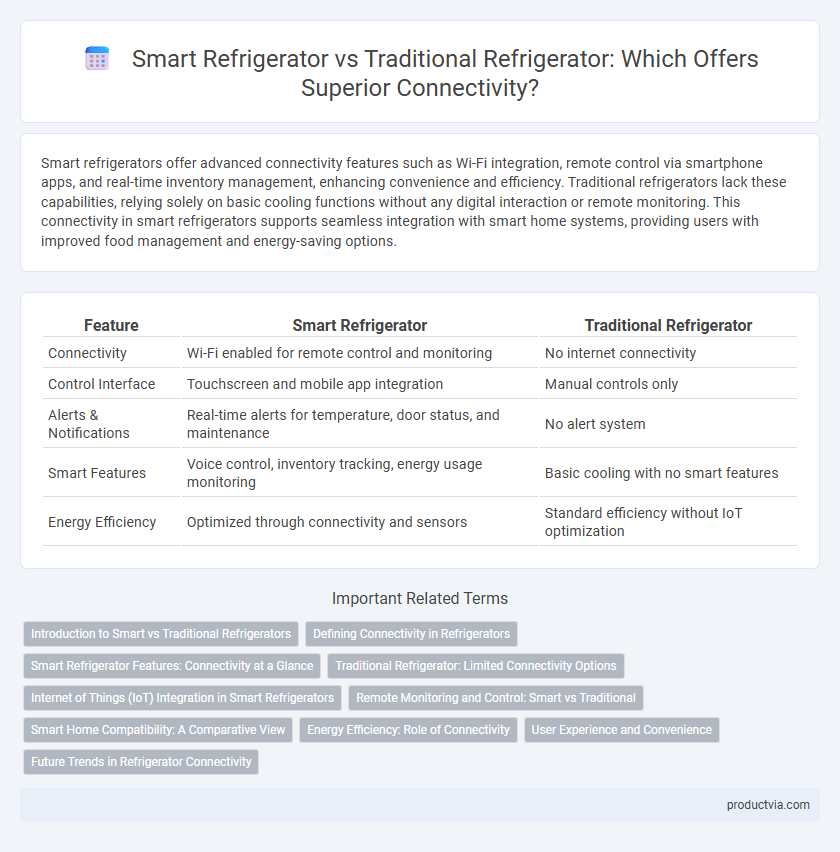Smart refrigerators offer advanced connectivity features such as Wi-Fi integration, remote control via smartphone apps, and real-time inventory management, enhancing convenience and efficiency. Traditional refrigerators lack these capabilities, relying solely on basic cooling functions without any digital interaction or remote monitoring. This connectivity in smart refrigerators supports seamless integration with smart home systems, providing users with improved food management and energy-saving options.
Table of Comparison
| Feature | Smart Refrigerator | Traditional Refrigerator |
|---|---|---|
| Connectivity | Wi-Fi enabled for remote control and monitoring | No internet connectivity |
| Control Interface | Touchscreen and mobile app integration | Manual controls only |
| Alerts & Notifications | Real-time alerts for temperature, door status, and maintenance | No alert system |
| Smart Features | Voice control, inventory tracking, energy usage monitoring | Basic cooling with no smart features |
| Energy Efficiency | Optimized through connectivity and sensors | Standard efficiency without IoT optimization |
Introduction to Smart vs Traditional Refrigerators
Smart refrigerators feature advanced connectivity options such as Wi-Fi and Bluetooth, enabling remote control, inventory management, and integration with smart home systems. Traditional refrigerators lack these digital interfaces, focusing solely on temperature regulation and basic food preservation. The shift toward smart models reflects growing consumer demand for convenience and technology-driven kitchen solutions.
Defining Connectivity in Refrigerators
Connectivity in refrigerators refers to the ability of smart refrigerators to connect to the internet and other devices, enabling features like remote temperature control, inventory management, and integration with smart home systems. Traditional refrigerators lack this connectivity, operating solely through manual controls without digital interfaces or network access. Smart refrigerators utilize Wi-Fi or Bluetooth technology, enhancing user convenience and appliance efficiency through real-time monitoring and automated alerts.
Smart Refrigerator Features: Connectivity at a Glance
Smart refrigerators offer advanced connectivity features such as Wi-Fi integration, remote control via smartphone apps, and compatibility with smart home systems, enabling users to monitor and manage their appliance from anywhere. These devices often include touchscreens, voice assistants, and real-time inventory tracking, enhancing convenience and energy efficiency compared to traditional refrigerators. Traditional refrigerators lack these connectivity options, providing only basic cooling functions without interactive or remote access capabilities.
Traditional Refrigerator: Limited Connectivity Options
Traditional refrigerators offer limited connectivity options, often lacking Wi-Fi or Bluetooth integration for remote monitoring or control. These models rely solely on manual adjustments and physical controls without the ability to sync with smartphones or smart home systems. As a result, they do not support features like inventory tracking, energy consumption reports, or voice assistant compatibility that are common in smart refrigerators.
Internet of Things (IoT) Integration in Smart Refrigerators
Smart refrigerators incorporate Internet of Things (IoT) technology to enable seamless connectivity with other smart home devices, allowing users to monitor and control settings remotely via mobile apps. Unlike traditional refrigerators, they feature sensors and Wi-Fi capabilities that provide real-time updates on temperature, inventory, and energy usage, enhancing convenience and efficiency. IoT integration in smart refrigerators supports advanced functions such as automated grocery ordering, voice assistant compatibility, and predictive maintenance alerts, which are absent in conventional models.
Remote Monitoring and Control: Smart vs Traditional
Smart refrigerators offer advanced remote monitoring and control features through smartphone apps, enabling users to adjust temperatures, receive maintenance alerts, and manage inventory from anywhere. Traditional refrigerators lack connectivity options, requiring manual checks and adjustments without remote access capabilities. The integration of IoT technology in smart refrigerators enhances convenience and energy efficiency compared to conventional models.
Smart Home Compatibility: A Comparative View
Smart refrigerators offer seamless integration with smart home ecosystems such as Amazon Alexa, Google Assistant, and Apple HomeKit, enabling remote control and real-time monitoring via mobile apps. Traditional refrigerators lack connectivity features, limiting user interaction to manual adjustments and lack of automation capabilities. Smart Home Compatibility in smart refrigerators enhances energy management, grocery tracking, and voice-activated commands, providing an advanced, interconnected kitchen experience.
Energy Efficiency: Role of Connectivity
Smart refrigerators leverage advanced connectivity features such as Wi-Fi and IoT integration to optimize energy consumption through real-time monitoring and adaptive temperature control. Traditional refrigerators lack these intelligent systems, often resulting in less efficient energy use due to static cooling cycles. Enhanced connectivity in smart models enables remote diagnostics and usage data analytics, significantly improving overall energy efficiency and reducing electricity costs.
User Experience and Convenience
Smart refrigerators offer enhanced connectivity through Wi-Fi and touchscreen interfaces, enabling remote control, grocery management, and integration with smart home systems. Traditional refrigerators lack these features, limiting user interaction to basic cooling and manual adjustments. The convenience of real-time notifications, voice commands, and personalized settings significantly improves user experience in smart models compared to conventional units.
Future Trends in Refrigerator Connectivity
Smart refrigerators leverage advanced IoT connectivity features such as Wi-Fi, voice control, and app integration to enable real-time inventory tracking and remote temperature adjustments, setting a new standard for kitchen convenience. Traditional refrigerators lack these smart capabilities, relying solely on manual controls without connectivity options. Future trends highlight the rise of AI-driven predictive maintenance, enhanced integration with smart home ecosystems, and increased use of cloud-based data analytics to optimize energy efficiency and user experience.
Smart refrigerator vs traditional refrigerator for connectivity Infographic

 productvia.com
productvia.com